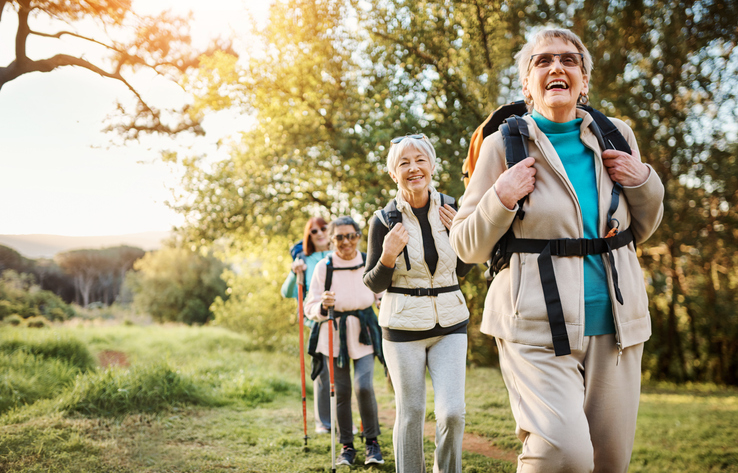Commitment + Clinical Leadership = Better Outcomes

Why Hiking is Good for Your Health
Hiking is the fourth most popular activity in the United States behind running, fishing, and biking. According to Statista, 50 million Americans went hiking in the year 2019. This makes hiking a popular activity that many Americans enjoy in their spare time.1
Whether you like to hike through the mountains, the forest, or the park, hiking is a fun activity that can help get your heart pumping and improve your overall health.
Here are some health benefits you can get from taking a hike today!
Hiking can Improve Your Mental Health
Researchers estimate that 1 in 4 adults suffer from a mental disorder, and many people enjoy hiking because it helps them relieve their anxiety and depression.2 Some studies link hiking to boosting your mood and improving your overall mental health.
One Stanford University study had participants take a 90 minute walk in a natural setting and studied how the brain changed. After the hike, there was a reduced amount of neural activity found in the subgenual prefrontal cortex, an area of the brain linked to mental activity.3 The reduced neural activity means that the brain is calmer, which can help reduce levels of depression and stress.
Another review looked at a series of studies concerning depression, anxiety, and mood and the effects that nature had on it. One finding that the researchers had was that nature positively impacts the brain during stress reducing activities such as walking. Landscapes and natural scenery have been found to play a role in reducing stress and improving an individual’s overall mood. Benefits can be seen in as little as 10-20 minutes and taper off around 50 minutes.4
Taking a 30 minute hike through nature can be one way to boost your mood, which in turn can help you feel better and improve your overall productivity. Try adding a few days of hiking into your week to see how it can help improve your mental health!
Hiking Can Improve Blood Pressure Levels
Hypertension (high blood pressure) occurs when your blood pressure is too high and pushes against the walls of the arteries. While hypertension usually doesn’t have any noticeable symptoms, high blood pressure puts you at risk for heart disease and strokes.5
Physical activities such as hiking have been found to help lower the body’s blood pressure levels because they can reduce the stiffness of the arteries, which helps blood circulate more easily. Research shows that hiking can reduce the body’s blood pressure by up to 10 points.6
One study looked at 529 participants with systolic blood pressure over 120mmHg to assess how walking affects blood pressure levels. The researchers found that those with higher blood pressure benefitted more from walking over the 6 month period, seeing an average of -21.3 mmHg reduction.7
If you have high blood pressure or are at risk for developing hypertension, hiking can be one way to help maintain healthy blood pressure levels.
Hiking Can Reduce Risk of Heart Disease
Heart disease is one of the leading causes of death in the United States, with an estimated 655,000 Americans dying from it each year. The risk of heart disease also increases with age because the arteries stiffen over time, which can increase your risk for high blood pressure and heart-related problems.8
One study looked at the link between walking and heart disease risk, with the researchers finding that those who walked 4 or more hours a day had a reduced risk for cardiovascular events. They found this to be true of all age groups, as well as those who had physical limitations or didn’t exercise as frequently.9
Regular exercise has been found to reduce your risk of heart disease by up to 40% because it gets the heart pumping, which can help improve blood flow circulation. Exercises such as hiking can also help your body manage cholesterol levels and improve sleep quality, which can help you lower heart disease risk.10
Hiking can be one way that you keep your heart healthy, and it can be a fun activity that you incorporate into your day to get your heart pumping.
Hiking Can Improve Bone Strength
As you age, your bones become more prone to fractures and joint conditions. Osteoporosis, meaning “porous bone,” is a condition where the bones become fragile and more likely to break. 1 in 3 women and 1 in 5 men over 50 are estimated to experience a fracture due to osteoporosis, making this a health risk that many older adults face.11
One study from the University of Washington found that women who walked for 1 hour for 3 days a week increased their bone density by 6% over the nine month study.12 Consistent exercise can help the body strengthen bones, which can help protect them from fractures.
To help keep bones strong, you’ll need to vary your hiking habits in order to help your muscles build strength. This can include brisk jogging, going up hills, and adding body-weight exercises between hiking. All of these variable exercises can help your body carry weight in different ways, which can help strengthen your bones.13
Go Out and Take a Hike Today!
Hiking is a fun activity that is relatively easy to incorporate into your week. You can choose to start hiking through parks and move onto hills or mountains when you’re seeking more of a challenge.
Saber Healthcare is an organization dedicated to providing consultant services to long term care providers. This article is for informational purposes and is not meant to be seen as professional advice. Please consult with a medical expert before relying on the information provided.
Sources
- https://www.advnture.com/features/hiking-facts
- https://www.hopkinsmedicine.org/health/wellness-and-prevention/mental-health-disorder-statistics
- https://www.pnas.org/content/early/2015/06/23/1510459112
- https://www.frontiersin.org/articles/10.3389/fpsyg.2019.02942/full
- https://www.saberhealth.com/news/blog/hypertension-risks-and-prevention
- https://www.honorhealth.com/healthy-living/6-best-exercises-control-high-blood-pressure
- https://www.ncbi.nlm.nih.gov/pmc/articles/PMC6119598/
- https://www.saberhealth.com/news/blog/how-heart-disease-can-be-prevented
- https://pubmed.ncbi.nlm.nih.gov/8576498/
- https://goalloutdoors.com/hike/hiking-can-help-prevent-heart-disease/
- https://www.saberhealth.com/news/blog/osteoporosis-signs-and-risk-factors
- https://americanhiking.org/resources/health-benefits-of-hiking/
- https://www.mayoclinic.org/walking-for-muscle-and-bone-health/art-20457588
